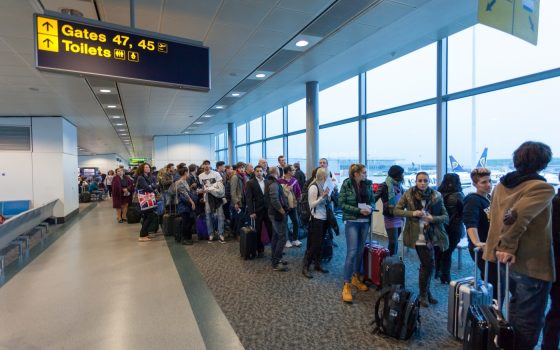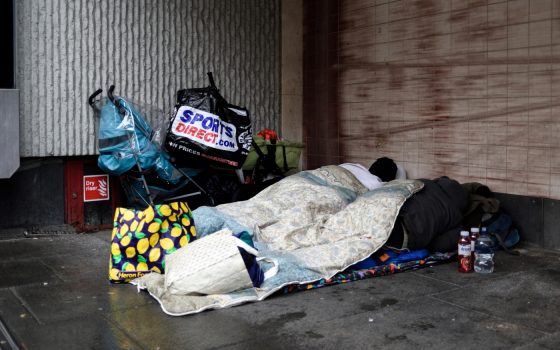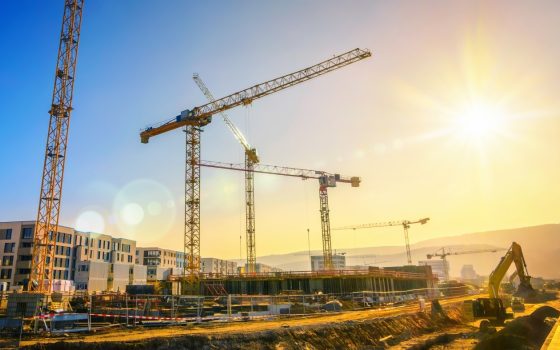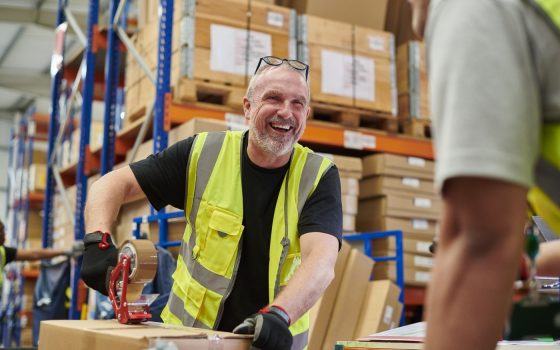350 leaders call for us to ‘build back better’ as new poll shows only 6% of the British public want things to go back to how they were before the crisis
The heads of the TUC and CBI, former Archbishop of Canterbury, and former head of the civil service join over 350 civic leaders calling for a stronger, fairer and greener recovery
29 June 2020
Leaders from charities, faith groups, businesses, trade unions, non-governmental organisations, community groups and arts and culture are today calling for a recovery plan that builds a ‘stronger, fairer and greener’ economy after the pandemic – one with high-quality public services, good jobs, a reduction in inequality and protection for the planet.
This call is backed by the British public, with a new YouGov poll showing that 31% of the GB public want to see big changes in how the economy is run coming out of the crisis, with a further 28% wanting to see moderate changes and only 6% of people wanting to see no changes. This appetite for change is matched by the lack of optimism about the economy in the wake of the crisis, with the poll showing that 44% of people are pessimistic when they think about the future of the economy, while only 27% are optimistic.
The group of over 350 leaders include Frances O’Grady, General Secretary of the TUC, Carolyn Fairbairn, Director-General of the CBI, Adam Marshall, Director-General of the British Chamber of Commerce, Rowan Williams, former Archbishop of Canterbury, David Walker, Bishop of Manchester, Rose Hudson-Wilkin, Bishop of Dover, Bob Kerslake, former head of the civil service and the heads of Oxfam, Shelter, Save the Children, Trussell Trust, Cafod, Greenpeace, Friends of the Earth, UK Student Climate Network, UK Youth, the Federation of Small Businesses, Faculty of Public Health and Tate Modern.
In a statement the leaders warn that #BuildBackBetter must be more than just a slogan. It must involve an ambitious collective response to:
- Provide high-quality public services: “How to ensure that the NHS, social care, other vital public services and housing are properly resourced and able to meet our future needs.”
- Tackle inequality: “How to mend the inequalities in our society, so that everyone can live a decent, rich life.”
- Create good jobs: “How to create secure, well-paid and rewarding jobs for all who want them, particularly young people.”
- Protect the planet: “How to reduce the risks, not just of future pandemics, but of the climate and environmental emergency already upon us.”
The group say they are committed to playing their part to build back better and are encouraging other organisations as well as national and local politicians to sign up to this ambition.
The YouGov polling also shows that there is a public appetite for action in these areas with:
- 81% of people in favour of the Government creating jobs for those that have lost their work through the coronavirus crisis, with only 3% opposed, 75% of people in favour of the Government creating jobs for young people with only 4% opposed. and 54% of people are in favour of the Government creating jobs for those whose jobs have been moved overseas, with only 9% opposed.
- 52% of people backing more borrowing to fund public services, with 13% opposing.
- 49% of people think that the crisis has made inequality worse, with only 9% saying it has improved equality.
- A third of people (33%) say tackling climate change should be a priority now, alongside the coronavirus, with a further 19% saying that it should be a priority once coronavirus is over, with only 7% saying it’s not a priority.’
Frances O’Grady, General Secretary of the TUC, said:
“We need to build a better and fairer economy as we emerge from this pandemic. It is very the least working families deserve. But this won’t happen unless the government acts now to support at-risk industries and prevent mass unemployment. And it won’t happen unless ministers commit to giving people dignity and stronger rights at work.
“This crisis has exposed huge inequalities in our labour market, with those in low-paid and insecure work forced to shoulder the most risk. That is not right. We can’t afford another race to the bottom on pay and employment standards. We need a new economic settlement that creates decent jobs across the UK.”
Dame Carolyn Fairbairn, Director-General of the CBI, said:
“The last few months have taken a heavy toll on the economy and it’s now more important than ever that the country finds a way through COVID-19 which priorities jobs and training, for the young especially.
“For business, Building Back Better means working alongside all strands of civic society to create a jobs-rich, fair and sustainable future for our country.”
Lord Bob Kerslake, former head of the civil service, said:
“As the country begins to emerge from the crisis it is becoming clear that people want a better future, not simply to return to where we were before. As with big crises in the past – from wars to the Great Depression – it was universally agreed that there was no going back.
“And so we have to ask deep questions about what kind of society and economy we now want to build. The moment we are in is a challenge to us all; to governments, businesses, civil society and citizens. But it is a challenge to which, together, we can rise and build something better.”
Emma Revie, Chief executive at the Trussell Trust, said:
“Ever since the outbreak of the pandemic in the UK, more and more people have needed food banks – the number of families at food banks doubled in April this year compared to 2019. This isn’t right. But this can change. We’ve seen in the past few months that we have the power to put protection in place for each other when we work together. We must build on this, and build back better. We can make sure we all have enough money for essentials. We can protect people from needing a food bank in the future. We can rise to this challenge if we work together to put justice and compassion into practice.”
Miatta Fahnbulleh, Chief Executive of the New Economics Foundation, said:
“As we emerge from this crisis, we must learn the lessons it has taught and also reflect on new sources of hope. The crisis has revealed a number of harsh truths – that our health and social care services had been under-resourced, and that longstanding inequalities have left too many people vulnerable.
“But we have seen what can be achieved when we are faced with a crisis – government can spend wisely, at speed and at scale. We have also seen how well we look after each other with care, neighbourliness and mutual solidarity clear threads binding our communities together and concern for wellbeing inspiring more sustainable and enjoyable ways of living.
“The time to build a new kind of world is now – we can build back better to an economy that is greener, stronger and fairer – one that provides decent public services and good jobs while protecting the planet and tackling inequality. “
Fatima Ibrahim, Co-Executive Director of Green New Deal UK and the Build Back Better campaign:
“We now know that even though scientists had warned us of the risk of a pandemic of this kind, we were not properly prepared. But that is also true of the climate and environmental emergency.
“Our recovery from this crisis could be a springboard to a green and resilient economy. There is now a widespread sense across society that we must build back better. To ensure this is not just a meaningless slogan we must improve public services, reduce inequalities, create good jobs and tackle climate change”
Contact
Sofie Jenkinson, 07981023031, sofie.jenkinson@neweconomics.org
Notes
The statement from the group can be found at https://www.buildbackbetter.org.uk
For more information on the build back better campaign, a coalition of 100 organisations campaigning for a coronavirus recovery plan which puts people and planet first, see: https://www.buildbackbetteruk.org/
The full polling is available here: https://neweconomics.org/uploads/files/YouGovresults_BBB_June2020.pdf
All figures, unless otherwise stated, are from YouGov Plc. Total sample size was 1,663 adults. Fieldwork was undertaken between 24th — 25th June 2020. The survey was carried out online. The figures have been weighted and are representative of all GB adults (aged 18+).
Full list of lead signatories below:
Faith groups: Rowan Williams (former Archbishop of Canterbury), David Walker (Bishop of Manchester), Olivia Graham (Bishop of Reading); Bishop Rose Hudson-Wilkin (Bishop of Dover); Rabbi Laura Janner-Krausner (Senior Rabbi to Reform Judaism); Rabbi Aaron Goldstein (Chair of the Conference of Liberal Rabbis and Cantors), Harun Khan (Secretary General, Muslim Council of Britain), Qari Muhammad Asim (Chair, Mosques & Imams National Advisory Board)
Business: Carolyn Fairbairn (Director General, CBI), Adam Marshall (Director-General, British Chambers of Commerce), Mike Cherry (National Chairman, Federation of Small Businesses), Jennifer Herrera (CEO, Good Business Foundation), James Perry (Co-founder of BCorps /Co-Chairman, COOK), Peter Holbrook (CEO, Social Enterprise UK)
Trade unions: Frances O’Grady (General Secretary, TUC), Len McCluskey (General Secretary, Unite), Dave Prentis (General Secretary, Unison) John Phillips (Acting General Secretary GMB), Dave Ward (General Secretary, CWU)
Charities & NGOs: Danny Sriskandarajah (CEO, Oxfam), Kevin Watkins (CEO, Save the Children), Polly Neate (CEO, Shelter), Emma Reverie (CEO, Trussell Trust), Christine Allen (Director, Cafod), Kathy Evans (CEO, Children England), Anna Feuchtwang (CEO, National Childrens Bureau), Stephanie Draper (CEO, BOND), John Sauven (Director, Greenpeace), Marian Turner and Hugh Knowles (CEOs, Friends of the Earth), Craig Bennet (CEO, Wildlife Trusts), UK Student Climate Network (UKSCN), Minnie Rahman (Public Affairs Manager, Joint Council for the Welfare of ImmigrantsI), May Boeve (Executive Director, 350.org), Fatima Ibrahim (Co-Director, Green New Deal UK)
Voluntary & community sector: Vicky Browning (CEO, ACEVO), Celia McKeon (CEO, Joseph Rowntree Charitable Trust), Moira Sinclar (CEO, Paul Hamlyn Foundation), Sarah Davidson (CEO , Carnegie UK Trust), Kate Hampton, CEO, Childrens’ investment Fund Foundation), Fadi Itani (CEO, Muslim Charities Forum), Ndidi Okezie (CEO, UK Youth), Matt Leach (CEO, Local Trust), Imandeep Kaur (Director, Civic Square)
Cultural institutions: Frances Morris (Director, Tate Modern), Sarah Munro (Director, BALTIC Centre for Contemporary Art, Gateshead),
Cross-bench peers: Bob Kerslake (former head of the Civil Service), Victor Adebowale (CEO of Turning Point), John Bird (founder of the Big Issue)






